
Overcome
How to cope with the grief of losing a spouse.
The late poet Donald Hall once referred to old age as “a ceremony of losses.” He would know, having outlived his wife, fellow poet Jane Kenyon, by more than two decades.
In older age, the loss of a spouse or a close loved one can produce overwhelming feelings of anger, irritability, and despair. Recovering from the loss requires time and a conscious effort to reinvent oneself in the aftermath, according to Steve Wonsiewski, R.N. Wonsiewski, the director of psychiatric services–senior behavioral health at Roxborough Memorial Hospital and Suburban Behavioral Health Campus, has extensive experience in psychiatric services and behavioral health management. To aid in this journey of reinvention, he prescribes several practical strategies:
* Engage in new hobbies or interests. Exploring new activities or revisiting past passions can be instrumental in helping individuals reclaim their identity. Enrolling in a cooking class, picking up an old musical instrument, or starting a new craft can lead to personal growth and provide a sense of accomplishment, even joy.
* Volunteer for a cause. Finding a group or cause to support can foster community. Volunteering not only builds connections with others, but also allows individuals to contribute positively to society and create meaningful ways to honor a loved one’s memory.
* Journal. Writing can be a powerful therapeutic tool, especially when it comes to processing complex emotions. Wonsiewski suggests that journaling offers a safe space to reflect on memories and articulate one’s journey through grief. This practice can also serve as a record of progress to help individuals visualize their healing.
For those unsure where to begin, Wonsiewski encourages reaching out for support—to friends, family members, spiritual leaders, etc.—for mooring in such a disorienting time. Likewise, local hospitals may provide listings of community resources for additional support.
Self-care is essential during difficult times. Maintaining a healthy diet, engaging in regular physical activity, and scheduling health check-ups can help mitigate the stress that often accompanies grief from a profound loss. Wonsiewski suggests that these everyday practices not only support emotional well-being but also empower individuals to face the challenges of loss with resilience.
Grief is a natural part of loss, but it can be paralyzing to some. If grief begins to interfere with someone’s ability to function on a daily basis, such as bathing, cooking, or cleaning, or if someone undergoes significant changes in eating or sleeping habits—and certainly if thoughts of self-harm arise—Wonsiewski says it’s time to seek professional help.
Donald Hall himself proved that life does not end with the loss of a spouse. Although he never forgot his wife—she seemed to remain a constant muse—Hall lived a full life and enjoyed a career as one of the nation’s most cherished poets. He passed away in 2018, three months shy of his 90th birthday.
Anyone who is suffering from mental health or substance abuse issues should call or text 988. The 988 Suicide and Crisis Lifeline provides 24/7 support for mental health, substance use, and suicidal crises. Reach Roxborough Memorial Hospital and Suburban Behavioral Health Campus offer services for seniors suffering from conditions such as depression, anxiety, bipolar disorder, and more. Call (215) 509-6800 for more information.
Published (and copyrighted) in Suburban Life, June 2025.


